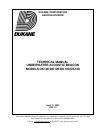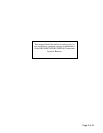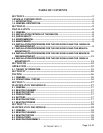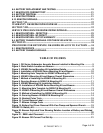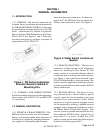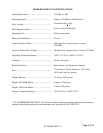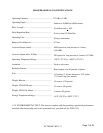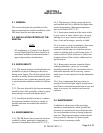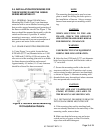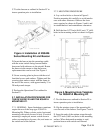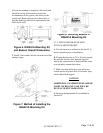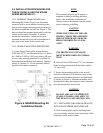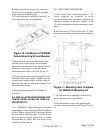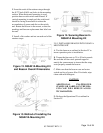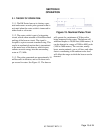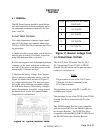
03-TM-0037 REV 13
Page 8 of 24
SECTION II
INSTALLATION
2.1. GENERAL.
This section describes the installation of the
beacon mounting kits and the installation of the
DK Series beacons into these mounts.
2.2. INSTALLATION CRITERIA OF THE
BEACON.
NOTE
All installations to Cockpit Voice Record-
ers and Flight Data Recorders should be in
accordance with the recorder manufacturer’s
approved procedures and hardware.
2.3. SURVIVABILITY.
2.3.1. The beacon location should minimize the
probability of physical damage to the device
during water impact. The aft mid-section of the
aircraft is normally the most desirable location
for the beacon, but consideration must be given
to environmental conditions outlined in Section
2.4.
2.3.2. The area selected for the beacon mounting
should be free of the possibility of heavy equip-
ment tearing loose and striking the device.
2.3.3. Installation should be made to a substan-
tial structural member, but kept as simple as
possible and must not weaken the structural
member.
2.4. ENVIRONMENTAL.
2.4.1. The DK Series beacon must not be disas-
sembled, crushed, penetrated, incinerated or
exposed to temperatures above 160°F (71°C).
2.4.2. The beacon is a battery-powered device
and installed shelf life is affected by higher than
normal temperatures. Maximum temperature
must not exceed 160°F (71°C).
2.4.3. Inadvertent actuation of the water switch
by any source of water, such as rain, salt spray,
melting ice or snow, head or washroom over-
flow, foods and beverages, must be avoided.
2.4.4. In order to avoid accumulation of moisture
on the water-switch, the device should be
mounted with the long axis of the beacon hori-
zontal or with the water-switch facing down. A
clean switch will allow moisture to collect into
droplets and run off the switch, without activat-
ing the beacon.
2.4.5. Honeycomb structure, tarpaulin fabrics,
clothing, parachutes, cargo, etc., are sound-
absorbing materials. Do not surround the device
with these materials and if necessary, remove
small areas of such materials from the immediate
vicinity.
2.4.6. Any compartment that may not be ex-
pected to flood under light impact should not be
used. Direct contact between the beacon case and
water is necessary for actuation and acoustic
radiation.
2.5. MAINTENANCE
In addition to observance of the preceding
mandatory considerations, where possible the
selection of a mounting location should provide
for convenient beacon access during inspection
intervals. The proper mounting location should
also provide for clearance for removing the
beacon from its mounting cradle.



